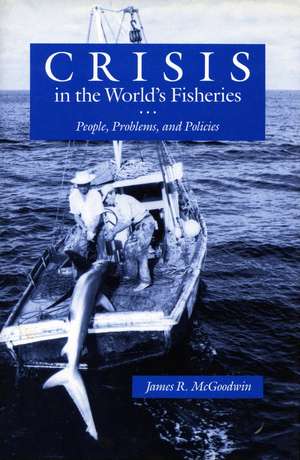Crisis in the World’s Fisheries: People, Problems, and Policies
Autor James McGoodwinen Limba Engleză Hardback – 31 dec 1990
For over twenty years, an alarming trend has emerged in the world's fisheries: there are too many fishers chasing too few fish. This book provides a broad overview and fundamental reassessment of fisheries management policies around the world.
| Toate formatele și edițiile | Preț | Express |
|---|---|---|
| Paperback (1) | 282.31 lei 6-8 săpt. | |
| Stanford University Press – 31 ian 1995 | 282.31 lei 6-8 săpt. | |
| Hardback (1) | 829.98 lei 6-8 săpt. | |
| Stanford University Press – 31 dec 1990 | 829.98 lei 6-8 săpt. |
Preț: 829.98 lei
Preț vechi: 1077.90 lei
-23% Nou
Puncte Express: 1245
Preț estimativ în valută:
158.83€ • 172.47$ • 133.42£
158.83€ • 172.47$ • 133.42£
Carte tipărită la comandă
Livrare economică 22 aprilie-06 mai
Preluare comenzi: 021 569.72.76
Specificații
ISBN-13: 9780804717908
ISBN-10: 0804717907
Pagini: 248
Dimensiuni: 152 x 229 x 20 mm
Greutate: 0.5 kg
Ediția:1
Editura: Stanford University Press
Colecția Stanford University Press
ISBN-10: 0804717907
Pagini: 248
Dimensiuni: 152 x 229 x 20 mm
Greutate: 0.5 kg
Ediția:1
Editura: Stanford University Press
Colecția Stanford University Press
Recenzii
"McGoodwin critically examines accepted fisheries management practices and advocates alternative approaches that would situate the social and economic needs of fishers at the forefront of policy considerations. Yet, the book is much more than that. As the title indicates, McGoodwin's book is sweeping in its coverage. It addresses virtually every aspect of fisheries—cultural, economic, political, and environmental. . . . It is a good introductory book for persons, no matter their discipline or profession, who are interested in natural resource management. . . . On the other hand, McGoodwin has provided a valuable service for all by pulling together in one place an extensive and timely review of the fisheries literature."—Natural Resources and Environmental Administration
"It is difficult to disagree with McGoodwin's overall argument: contemporary fisheries management must change. His book provides a broad review of fisheries management policies and an important prescription for an ailing industry and way of life. It is written in a style that commends itself to fishers, fisheries managers, and academics alike. It is an important book whose audience is sure to extend far beyond the bounds of maritime anthropologists."—American Anthropologist
Textul de pe ultima copertă
“McGoodwin critically examines accepted fisheries management practices and advocates alternative approaches that would situate the social and economic needs of fishers at the forefront of policy considerations. Yet, the book is much more than that. As the title indicates, McGoodwin’s book is sweeping in its coverage. It addresses virtually every aspect of fisheries—cultural, economic, political, and environmental. . . . It is a good introductory book for persons, no matter their discipline or profession, who are interested in natural resource management. . . . On the other hand, McGoodwin has provided a valuable service for all by pulling together in one place an extensive and timely review of the fisheries literature.”—Natural Resources and Environmental Administration
“It is difficult to disagree with McGoodwin’s overall argument: contemporary fisheries management must change. His book provides a broad review of fisheries management policies and an important prescription for an ailing industry and way of life. It is written in a style that commends itself to fishers, fisheries managers, and academics alike. It is an important book whose audience is sure to extend far beyond the bounds of maritime anthropologists.”—American Anthropologist
“It is difficult to disagree with McGoodwin’s overall argument: contemporary fisheries management must change. His book provides a broad review of fisheries management policies and an important prescription for an ailing industry and way of life. It is written in a style that commends itself to fishers, fisheries managers, and academics alike. It is an important book whose audience is sure to extend far beyond the bounds of maritime anthropologists.”—American Anthropologist












